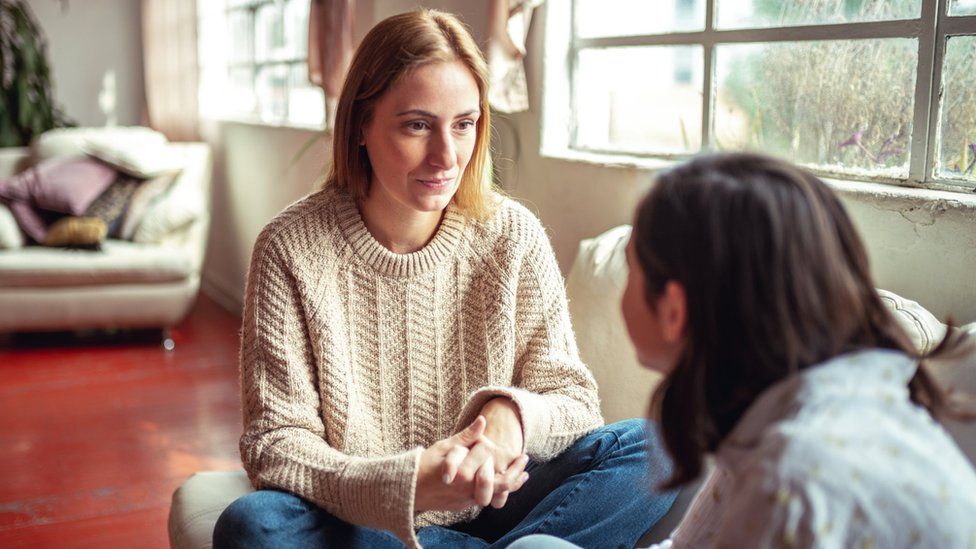Coronavirus: Keep it simple, stick to facts - how parents should tell kids
- Published

With the number of coronavirus patients rising around the world, children are being exposed to information and misinformation from many sources. How can parents best keep them up to date without terrifying them?
"Will I get sick?"
"Will my school close?"
"Will grandma or granddad die?"
Coronavirus is dominating the news and children, as always, are asking direct, difficult questions about what's going to happen.
While the risk of young people being seriously affected by the virus appears low, doom-laden social media posts and playground rumours can induce panic.
Stories of deaths, possible food shortages and school closures, and the circulation of phrases like "pandemic potential" can add to a sense of alarm.
Keeping control
So tone is vital when discussing coronavirus with a child, advises Angharad Rudkin, clinical psychologist and consultant on the parenting book What's My Child Thinking?
"We all enjoy scare stories to a degree, but we don't like to hear them quite so much when they're a bit closer to home," she says. "Help your child put some distance between them and the threat by giving information about how coronavirus is spread and what we can do to help minimise the risk such as using loads of lovely bubbles when washing our hands."
Children's coronavirus questions - answered
Covid-19 is a respiratory disease caused by the new coronavirus which seems to start with a fever, followed by a dry cough. After about a week, it leads to shortness of breath and some patients require hospital treatment.
Medics aren't sure exactly how it spreads from person to person, but similar viruses do so via droplets, such as those produced when an infected person coughs or sneezes.
It's essential to talk to a child about things he or she can control, such as disposing of tissues and personal hygiene, Dr Rudkin says, rather than those they cannot.
Once the explanation is over, the conversation should move on to something that "isn't threatening, such as what they had for lunch or who do they think is going to win the football match this evening", she adds.
- LIVE UPDATES: Latest on coronavirus
- EASY STEPS: How to keep safe
- A SIMPLE GUIDE: What are the symptoms?
- GETTING READY: How prepared is the UK?
- MAPS AND CHARTS: Visual guide to the outbreak
The virus could affect millions of people around the world soon. The UK government says, in its latest plans, that up to a fifth of workers could be off sick at the peak of an epidemic, with school closures possible.
One problem in explaining the virus is that it's difficult to predict what will happen, though early, albeit limited, evidence suggests children with Covid-19 have tended to show mild symptoms.
While parents have long experience in explaining global threats - war, terrorism and climate change - pre-adolescent children are still developing their ability to assess risk, says Dr Rudkin. So it's important to find out what their level of worry over coronavirus is.
"Be clear that you don't know all of the answers but that there are people making decisions for us who have all the information they need."
Parents, in turn, should be as informed as possible before explaining issues to children, including keeping up with official advice, Dr Rudkin says.
How to wash your hands: 30-second guide
In the event that a boy or girl catches coronavirus, parents are advised not to overplay any risk to their health.
"You could tell them it's 'a bit like feeling sore', so they get to see it's not as dreadful as they might believe," Jon Gilmartin, a speech language therapist at the children's communication charity I Can, says.
Older people and those with existing health conditions are thought to be most at risk of death or serious sickness from catching coronavirus. This could lead children to worry about older friends and relatives.
Dr Rudkin advises honesty over the argument "we will all die eventually but chances are not until we are really, really old".
Use simple language
"But we can talk about it with a smile and use humour, or at least a lightness of touch, that doesn't then plummet our children into an existential pit they really don't need to be in, until they're 13 at least," she adds. "Reassure your child that you and granddad are really fit and strong and that you will continue to do all you can to keep yourself/granddad healthy and safe."
Children's capacity to deal with complex and worrying information increases with age, so the way a parent speaks to a three-year-old is very different to dealing with a teenager - and it involves a personal judgement.
But Mr Gilmartin suggests the use of "simple language" for all age groups and allowing children to ask "lots of questions" to show they're being listened to.
Parents who themselves are looking for the right language to use, could start with the BBC's Newsround coverage.
Children, like the rest of the population, are exposed to myths and misinformation about coronavirus, via playground gossip and, particularly among pre-teens and teenagers, on social media.
The best way to combat this is providing "age-appropriate information and reassurance", says Dr Rudkin, as the source young people trust best is a parent.
- Published6 October 2021
- Published23 March 2020